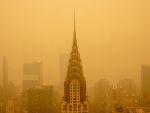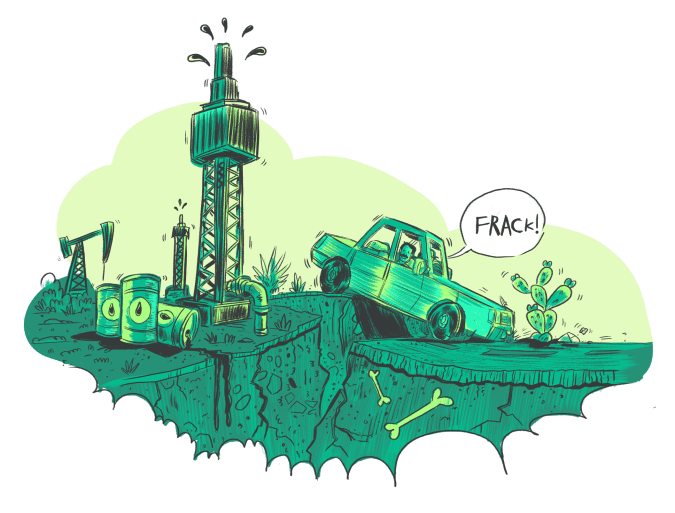In August of 2017, Hurricane Harvey hit Houston, Texas. It left behind a wreckage that cost the city $125 billion in damages and killed more than 80 people. Houston Mayor Sylvester Turner called it a “historic devastation.”
Scientists have concluded that climate change made Harvey stronger. “Climate change contributed to certain aspects of Harvey,” said Texas State Climatologist and Regents Professor of Atmospheric Science, John Neilsen- Gammon, specifically the amount of extreme rainfall.
Harvey emptied over 27 trillion gallons of water, making it one of the rainiest hurricanes.
A study by the international scientific consortium found that global warming made Harvey’s rainfall 15%more intense. Prior to Harvey, the previous state record for rainfall was set at 21.39 inches back in 1899; Harvey averaged around 51, the most recorded in the continental U.S.


Harvey is just one example that showcases how Texas is already being affected by global warming. Another side-effect the state is experiencing is hotter temperatures.
The summer of 2019, the combined temperatures of August and September broke the record for hottest temperatures in Texas, according to Neilsen-Gammon.
A recent study by Climate Central, an independent organization, identified 198 cities that have had increases in “heat days,” or days when temperatures reached more than 90 degrees Fahrenheit, in the last four decades. McAllen had the highest increase in the nation for heat days, as well as “danger days,” or days when the temperature reaches at least 105 degrees Fahrenheit. At 105 degrees Fahrenheit, people can experience heat cramps or heat exhaustion, and a heat stroke becomes possible.
“It’s already so incredibly hot down there and it’s just getting worse and worse. So much that I’m advocating for my parents to move because they’re old and can’t go outside anymore,” said Jackelin Elizabeth Treviño, movement strategist, she now lives in Austin, but grew up in the Rio Grande Valley. Treviño added that when she worked as a community organizer in the RGV there were canvassers passing out from heat strokes. “With how hot the temperatures are getting it’s getting harder to stay hydrated.”
The heat is taking a toll on Texans’ lives. A joint GateHouse Media/Austin American-Statesman investigation looked at death records from seven Texas counties and found that an estimated 1,400 people — 70 per year — have died of heat-related causes in Texas, second to Arizona, since 1999.
In “The Impact of Global Warming on Texas,” scientists predict Texas will experience more heat waves, biodiversity will decline, coastal flooding and erosion will cause damage to the coastal zone, the health of people that live in cities will be impaired by smog-forming gases from fossil fuel plants, heat stress for people and livestock will intensity, etc. These are just a few of the weather phenomena predicted for Texas.
Across the state, poor, brown and black communities, who have less access to resources, will bear the greatest brunt when it comes to climate change.
On effects to large cities, David Hitchcock, former Director of Sustainable Transportation Programs at Houston Advanced Research Center, writes:
“Those cities with a hot, arid climate, such as El Paso, already face water resource challenges and are vulnerable in the future to a hotter, drier climate that will exacerbate these conditions. Gulf Coast areas, including Houston, face the prospect of more frequent and severe storms, as well as the threat of a rising sea level. Central and North Texas cities (including Austin, San Antonio, and the Dallas–Fort Worth area) are not directly vulnerable to sea-level rise, but they will experience the consequences of more frequent and severe storms generating from the Gulf Coast. Texas cities are projected to continue their pattern of growth and expansion, making them increasingly vulnerable to water-supply shortages and the impacts of increased energy demand.
Rural cities in Texas will likely be less equipped to address these changes.
“The bigger the city, the bigger the economic the base, the more the jurisdiction is able to develop the detailed information they need for planning purposes, smaller towns generally don’t have the ability to do that,” said Neilsen-Gammon.
However, climate change is a disproportionate issue.
“So, we all suffer from pollution, but some communities suffer more, disproportionately,” said Miguel Escoto, HUB coordinator of Sunrise El Paso.
Across the state, poor, brown and black communities, who have less access to resources, will bear the greatest brunt when it comes to climate change.
“[It] is absurd to separate people from the environment,” said Treviño. “If you’re not factoring people, you’re not centering people, then you’re not looking at it holistically. And you’re not really reflecting the environment.”
Climate change also impacts immigration, which affects border cities in Texas. Environmental activists from the Texas borderlands emphasize climate-based migration as one of the consequences of global warming.

“It’s sort of mundane to just discuss the weather. The crisis that we have is not just a little more rain, or a little more sun, it literally is changing the ecosystem that we have cultivated, or contaminated, depending and who you are, and it literally is pushing people out of their communities,” said Cemelli De Aztlan, Network Weaver for the El Paso Equal Voice Network.
As early as the ‘90s, the Intergovernmental Panel on Climate Change estimated that by 2050, as many as 150 million people will be displaced because of climate change. According to a 2009 report by the Office of the UN High Commissioner for Human Rights, although industrialized countries like the United States have contributed the most to greenhouse emissions, it is poor countries that have contributed the least to climate change that will be the most impacted by climate based migration.
Experts point to drought as one of the factors driving current spikes in Central American migration. Food insecurity, which is being intensified by drought, is one of the leading reasons Central American immigrants leave their home country. “When we talk about the climate crisis, we need to be talking about forced migration, we need to be talking about the asylum seekers camped out on the border who left in social disarray,” Aztlan said.
Alex Bay, who is currently a law student at the University of Miami and organized a climate march in McAllen, emphasized that climate change is not recognized as a valid reason to claim asylum in the U.S. “I think there’s a lot of folks that are coming to the border and claiming climate issues as reasons for why they had to leave [their] home country and they’re not [doing] anything domestically or internationally to legally support their claim,” Bay said. “But that doesn’t mean that their claim is invalid; it just means that they don’t have the legal relief.”
Experts point to drought as one of the factors driving current spikes in Central American migration.
Uniquely present along the Texas borderlands are also colonias; settlements that were historically created outside of the city limits by working-class people, mostly of Mexican descent, because they could not afford to live in the city. Because they were unregulated, developers created these settlements without basic infrastructure and services like sewage, paved roads, running water, and electricity. Currently, the degree of need varies, but there are still many colonias without basic services, like sewage.
“I genuinely believe that if the valley were hit with even remotely by a weather system, or hurricane, especially, I would venture to say most colonias would be destroyed,” Bay said.
In the Rio Grande Valley, colonias are heavily damaged by floods.
Treviño said a recent flood devastated colonias in the RGV. “Colonias were underwater for days,” she said. “A lot of my closest friends were up to their knees and thighs in really tainted water helping people move their precious belongings.”
“I would say anybody that is concerned about climate change needs to be really concerned about people that live in colonias,” Bay said.

Texas Policy
Despite the overwhelming amount of science and current climate events, which provide factual evidence in support of climate change, the Texas legislature has time and time again ignored, refuted, or attempted to debunk science altogether.
Despite Texas ranking as the No.1 emitter of carbon dioxide in the U.S., the state legislature has not acted on climate change.
“There’s a state of denial in the state of Texas of what is happening in our communities,” said Aztlan.
Nielson-Gammen said there are efforts to address climate change at the state level. “People are dealing with climate change without necessarily calling it climate change. We’re experiencing different weather conditions, and I think the state, rather than focusing on causes, is focusing on solutions,” he said.
The state has attempted to combat regulations enacted at the federal and local level. Back in 2010, former Texas Governor Perry and then State Attorney General, now Gov. Greg Abbott, filed a lawsuit against the Environmental Protection Agency over its finding that greenhouse gases affect public health; the GHG rule allows for greenhouse gases to be regulated under the Clean Air Act.
Despite Texas ranking as the No.1 emitter of carbon dioxide in the U.S., the state legislature has not acted on climate change.
“The state has demonstrated a willingness to be hostile to municipalities to regulate themselves in terms of how they want to address these issues,” Bay said.
The city of Denton passed a ban on hydraulic fracking, which has been linked to causing earthquakes. In response to the local ban, the state legislature passed a bill that “pre-empts regulation of oil and gas operations by municipalities and other political subdivisions.” The bill, which was signed into law by Gov. Abbott, basically blocks municipalities from passing their own regulations.
“Their priority is not keeping the people safe, their priority is to use environmental resources to grow the economic output of the state of Texas,” said Treviño, who lobbied for the Green Fund, a bill, signed into law, that allows campuses to create funds from student fees to be used for sustainable projects.
Despite the stance of the state legislature, at the local level, activists and municipalities are taking steps to address climate change.
Cities like El Paso, Dallas, Austin, and San Antonio were amongst 23 Texas cities that joined the Mayors’ Climate Protection Agreement, a 2005 national bipartisan coalition of 132 U.S. mayors that had agreed to reduce greenhouse emissions to 1990 levels by 2012.
Austin has been at the forefront of responding to climate change. The city council approved a multi-pronged energy efficient plan back in 2010, which would increase their renewable energy use up to 25%. The city also has a publicly owned utility company, something Escoto wanted to bring to El Paso. He was fighting efforts by J.P. Morgan to buy El Paso Electric company. But, the sale was approved by the El Paso city council.

“If you’re a private equity fund and you own a public utility, you want as much paying customers as possible, so you try to dissuade those customers from renewable [energy],” he said. “We see this as a climate justice issue. They are picking on a city that is 80% Hispanic, 80% Latinx because they think we won’t fight back.”
San Antonio also has a municipally owned utility company, and recently approved a Climate Action and Adaptation Plan, which sets out a plan to fully curb out greenhouse emissions by 2050.
“We have a lot of control over our own city government, that’s where we have to start. We have to build our revolutions locally,” Escoto said.
Credits
Written by Maria Esquinca
Illustrated by Zeke Peña
Edited by Erika Ramirez
Produced by Itzel Alejandra Martinez




